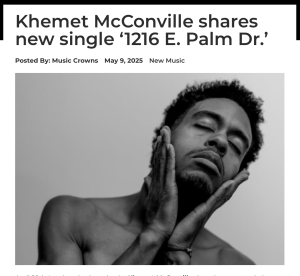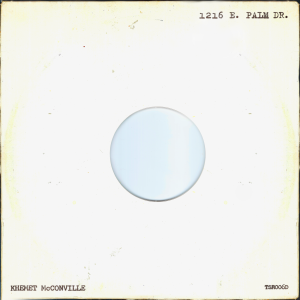Khemet McConville has a new release, “1216 E Palm Dr”. He’s been featured as a new music discovery artist on Earmilk.com—a legit digital music magazine with a strong reputation for being not pay-for-play. No paid articles, no fluff. Like thousands of unsigned independent artists, he and his music are buried, overlooked, and dismissed because of what I’ll call the mathefication of music discovery.

Nolwen Cifuentes
If you step outside the algorithm—invest just a little time and go beyond Spotify and AI recommendations—you’ll find incredibly creative work by musicians like Khemet. His album “Quantum Shift” includes both instrumentals and vocal tracks like “A Woman Of God,” “Nothing Is Easy,” “In The Heat Of The Night,” “The Fall Has Come,” and “Augmented Reality.” These tracks have received European radio play and recognition on both sides of the Atlantic. If they had come from someone like André 3000, Frank Ocean, or Kevin Parker (Tame Impala), the media coverage would have been overflowing. No algorithm needed.
His follow-up singles, “I Look Through Your Window” and “Your Mother Said,” stand out creatively and hold their own against the formulaic, easy-to-classify tracks Spotify pushes. These songs were created entirely on his own equipment, at home. No studio budget, no record label machine. He even self-produced and self-edited two fantastic live performance videos at the legendary EastWest Studios in Los Angeles—on a razor-thin budget—and they hold up visually and sonically next to record label video productions that cost 10 to 20 times more.
But algorithm-driven platforms don’t know what to do with artists like this. Spotify and AI don’t understand music that blends genres, tells longer stories, or doesn’t fit into a pre-packaged “vibe.” These systems are built on formulas, patterns, mood boards. They can’t measure subjective things like emotional impact, uniqueness, or beauty—things rooted in human lived experience.

YouTube Channel
Fantano
Two voices I have to shout out here are Anthony Fantano of The Needle Drop and Liz Pelly, author of The Mood Machine: The Rise Of Spotify And The Cost Of The Perfect Playlist. If you haven’t seen it, Anthony interviews her in a great video called “Spotify Doesn’t Want You to See This” on his YouTube channel.
In Anthony Fantano’s YouTube interview with Liz Pelly on his The Needle Drop Channel they both come from a place of deep musical knowledge, and they genuinely care about independent artists and real musical creativity. What they lay out is hard to deny: the tools that were supposed to help us find more music we love have started narrowing the field instead. The current system makes it harder for truly creative, original, genre-defying musicians to survive—let alone get discovered. And I would add this: It’s not just hurting artists. It’s also hurting us—the listeners. It’s making it harder for us to think freely, explore freely, and hear something new that changes how we see or feel.
At first, the idea behind AI music discovery (at least as I understand it) was for the technology to learn from our individual taste. To watch what we listened to and then recommend based on that. But somewhere along the way, that flipped. Now it feels more like AI is telling us what we want, what to like, and how we’re feeling—then serving up music to match that version of us.
How The Algorithm Is Training Us to Settle for Sameness

One Signal Publishing
We’re at a point where the algorithm doesn’t just influence playlists—it shapes the entire industry. What rises to the top of streaming platforms, what gets past gatekeepers like SubmitHub, and even what individual reviewers choose to write about is often decided by what fits algorithm-approved templates.
And here’s the worst part: more and more artists feel pressure to conform. They make shorter songs. They cut the intros. They drop a hook within the first 15 seconds. It’s not about making art anymore—it’s about checking the boxes that please the machine. And many curators and reviewers today don’t even have a background in music, journalism, or critical thinking. Their frame of reference is the algorithm, not the art.
This creates a dangerous feedback loop: the system rewards sameness, listeners become used to sameness, and artists feel they must conform to get heard. Meanwhile, the boldest, weirdest, most creative voices get silenced.
This Isn’t Just About Music. It’s About Thought.

Keenan
Music isn’t something that can be reduced to data points. Our reactions to music come from our emotions, our memories, our culture—our humanity. The more we let AI define our taste, the less we practice discovery for ourselves. We lose our curiosity. We lose surprise. We lose thoughtfulness.
We’re not just missing out on good music—we’re missing out on the chance to discover something that could change us. Something that doesn’t fit neatly into a playlist mood like “chill vibes” or “sad girl autumn.” Something that we didn’t know we needed until we found it.
Letting AI tell us what we like is like asking someone from the Baroque era to evaluate a Picasso from his Cubist period. They don’t have the language, the context, or the frame of reference. The art doesn’t change—but its meaning is lost in translation.
In humanity’s relationship to music an individual’s preferences, internalization of meaning and appreciation of music is rooted in one’s own individual lived experiences, reflections and emotions. These cannot be “mathematized” via AI’s creation of music genres and delivery of playlist that AI TELLS us are what we want. As we allow automated music curation and classification to move us in this direction, we lose more than authentic organic music discovery and appreciation. We lose individual original thought. We endanger access to beautiful creative musical voices and genres that we don’t know matter to us because we will never get to discover them. Click to Listen to Khemet McConville’s new track “1216 E Palm Dr” https://open.spotify.com/album/6oPZi0XNLkjMguQbaNuK3n?si=aivY86_DRq-5BtbFo5WOHg
